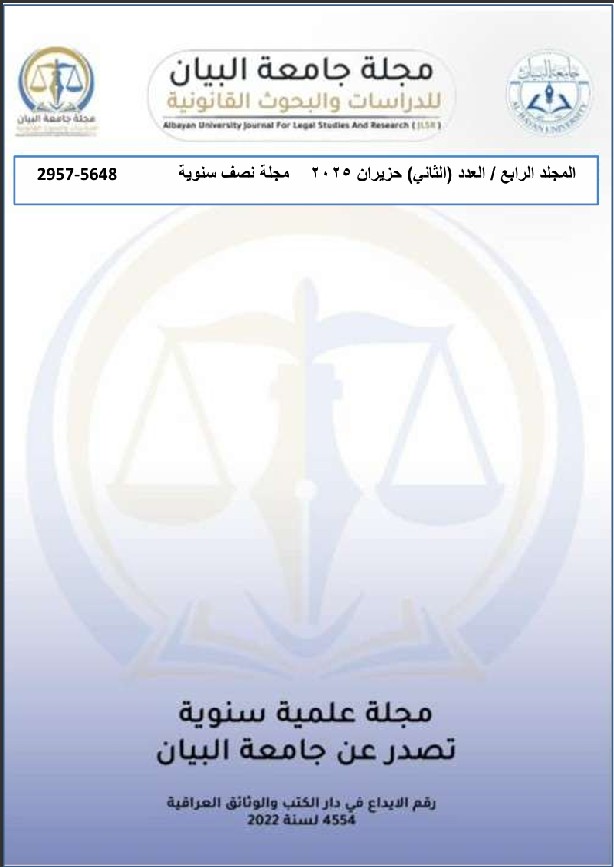الاستراتيجية الوطنية لمكافحة الفساد من منظور القانون الجزائري والتونسي
DOI:
https://doi.org/10.65263/qdhat005الكلمات المفتاحية:
مكافحة الفساد، الشفافية، السلطة العليا للشفافية والوقاية من الفساد ومكافحته، الهيئة الوطنية لمكافحة الفساد.الملخص
المراجع
Books
1. Ibn Manzur. (n.d.). Lisan al-Arab (Vol. 5). Cairo: Dar Al-Ma'arif.
2. Al-Sanousi, R., & Al-Douibi, A. B. (2006). Corruption Between Transparency and Accountability. 1st ed., Benghazi: National Book House.
3. Al-Sanousi, R., & Al-Douibi, A. B. (2006). Corruption Between Transparency and Accountability. Benghazi: National Book House.
4. Aboud, S. M. (2008). The Phenomenon of Administrative and Financial Corruption: A Study in the Problem of Reform and Development. Baghdad: Dr. Publishing House for Sciences.
5. Al-Juraish, S. M. (2003). Administrative Corruption and the Crimes of Misuse of Functional Authority. Riyadh: King Fahd National Library.
6. Al-Kubaisi, A. (2005). Corruption and Globalization: Coincidence or Harmony. Riyadh: Modern University Office.
7. Al-Jabri, A. H., & Robert. (Trans. Hajjaj, A. H., Rev. Jaraz, F.). Controlling Corruption. Jordan: Al-Bashir Publishing.
8. Al-Bahji, I. A. (2014). Transparency and Its Impact on Combating Corruption. Egypt: Al-Bahja Publishing.
9. Al-Absi, A., & Labzah, H. (2019). Methods of Combating Administrative and Financial Corruption and Corporate Governance. Amman: Dar Al-Ayyam.
10. Swalhia, I. (2020). Independent Administrative Authorities in Arab Systems. London: Dar Kutub Publishing.
Articles and Research Papers
1. Bouraoui, A., & Drajji, S. (2023). Addressing corruption in Algeria: The new national strategy (High Authority as a model). Tabnah Journal of Academic Scientific Studies, 6(1).
2. Bin Malik, A., & Oqbawi, M. A. (2022). The legal framework of the High Authority as a control mechanism. Academic Journal of Legal and Political Research, 6(2).
3. Boukhalfa, F. (2022). The High Authority: Between legal requirements and real-world challenges. Tabnah Journal of Academic Scientific Studies, 5(2).
4. Heltali, A. (2023). Law 22-08 establishing the High Authority: Change and relevance. Journal of Legal Studies and Research, 8(1).
5. Ben Azzouz, M. (2016). Administrative and economic corruption: Effects and mechanisms – Algeria case. Algerian Journal of Globalization and Economic Policies, (7).
6. Bouzeira, S. (2023). Observations on the High Authority under Law 22/08. Journal of Rights and Freedoms, 11(1).
7. Taleb, A. K., & Haj Moussa, M. (2022). Combating administrative and financial corruption through the High Authority. Journal of Economic Analysis and Supervision, 3(2).
8. Qarawi, A. (2020). The Independent Election Authority and the High Authority for Transparency. Constitutional Council Journal, Special Issue (14).
9. Mustafawi, K., & Maazouz, A. (2021). Role of the High Authority in the 2020 constitutional amendment: New approach or continuity? Journal of the Legal Analyst, 3(2).
10. Rais, M., Mchri, F., & Nasib, A. (2013). Banking governance as a mechanism to combat administrative corruption – Algeria case. Journal of Banking Economies and Business Administration, 2(2).
11. Ben Bouabdallah, W., & Malah, M. (2022). The High Authority: Reading in Law 22-08. Journal of Legal and Political Thought, 6(2).
Legislation
1. Law No. 16-01 of March 6, 2016, on the Constitutional Amendment. Official Gazette of the Republic of Algeria, No. 14 (March 7, 2016).
2. Constitution of the People’s Democratic Republic of Algeria (2020). Official Gazette, No. 82 (December 30, 2020).
3. Organic Law No. 10 of 2017 (March 7, 2017) on reporting corruption and protection of whistleblowers.
4. Presidential Decree No. 06-314 on the composition, organization, and functioning of the body, as amended by Decree No. 12-64.
5. Law No. 22-08 of May 5, 2022, organizing the High Authority for Transparency and the Prevention and Combating of Corruption. Official Gazette, No. 32 (May 14, 2022).
6. Law No. 16 of 2008 (February 25, 2008) approving the United Nations Convention Against Corruption. Official Gazette, No. 18 (February 29, 2008).
Foreign References
1. Genton. M, les autorités administrative independents, meontchestien, paris, 1996
2. Yadav, Gopal J., “Corruption in developing countries causes and solutions”, global blues and sustainable development: the emerging challengers for bureaucracy, technology and governance international political science association, university of south Florida, September 2005
التنزيلات
منشور
إصدار
القسم
الرخصة
يحتفظ المؤلفون بحقوق الطبع والنشر الكاملة لمقالهم المنشور.
تُطبّق مجلة جامعة البيان للدراسات والبحوث القانونية (AUJLSR) رخصة المشاع الإبداعي المنسوبة 4.0 الدولية (CC BY 4.0) على مقالاتنا وأعمالنا الأخرى. إذا أرسلتَ بحثك للنشر من قِبل AUJLSR، فإنك تُوافق على تطبيق رخصة CC BY 4.0 على عملك.
يمكن قراءة المقالات ومشاركتها وفقًا للشروط التالية:
النسبة: يجب أن تُنسب إلى المصدر الأصلي (Attribution).
التفاصيل الكاملة متوفرة على الرابط:
https://creativecommons.org/licenses/by/4.0/



